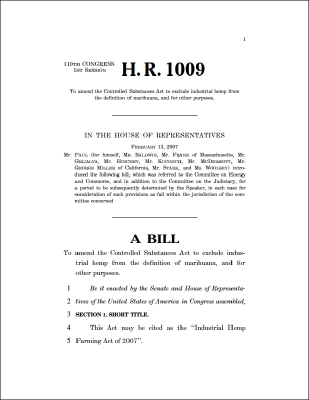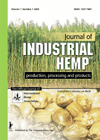
iGive to Vote Hemp
| Home |
| The Industrial Hemp Store |
| FAQ |Trade Organizations | Events & Trade Shows | Activism & Lobbies | Government links |
| Higher Education | Shopping | Distributors | Manufacturers | References | Search tools |
| News links | Hemp pictures | .pdf downloads | Site Map |
| State Hemp Legislation |
| Action Page |


Industrial Hemp seedlings grow in the Hawai`i test patch.
© 2000 Ken Ige, Honolulu Star-Bulletin
Used by permission

H.R. 1009 Introduced in Congress
Bill Would Allow States to Legally Grow Hemp
Click Here and ask your Member of Congress to Support
The "Industrial Hemp Farming Act of 2007"
Newest site additions:
Welcome to the IndustrialHemp.net web site Utne magazine readers. I have added a new question to our FAQ. It is really two questions and they are the ones that I am asked most often now: What can I do to make a difference? How can I help?
The answer is: There are many things that you can do. In the end it comes down to two things: education and money. People need to know about hemp and its usefulness and buy hemp products. Please take a look at our updated Action Page for more ideas.
The Journal of Industrial Hemp is the hemp industries' peer reviewed journal. It is a great resource and well worth reading.

IndustrialHemp.net readers:
Please download the Table of Contents for just released Journal of Industrial Hemp, Volume 7, Number 2 - 2002, click on the PDF icon below. (PDF file 85K)
![]()
Check it out and then subscribe to the journal at Haworth Press using the link below:
Haworth Press - Journal of Industrial Hemp
We work very hard to bring quality, up to date information on the subject of Industrial Hemp to our readers. We hope that you enjoy the work we put into it. For running commentary on hemp news around the world and all things related to hemp please see our new blog at The Hemp Report.
Thanks for visiting.
Tom Murphy
IndustrialHemp.net
The Ultimate Web Resource For Hemp
IndustrialHemp(at)mac.com
Frequently Asked Questions
1. Q: What is Industrial Hemp?
A: Industrial Hemp is a number of varieties of Cannabis sativa L. that are intended for agricultural and industrial purposes. They are grown for their seed and fiber content as well as the resulting byproducts such as oil, seed cake, hurds, etc. Industrial Hemp is characterized by being low in THC (delta-9 tetrahydrocannabinol) and high in CBD (cannabidiol). THC is less than 1% and in Canada and Europe the current legal level for cultivation is 0.3%. The ratio of CBD to THC is greater than one.
2. Q: What is marijuana?
A: Marijuana is a preparation made from varieties of Cannabis sativa L. that are intended for medical and recreational drug use. They are grown for their THC content, primarily in the flowering tops and to a lesser extent in the leaves. Cannabis sativa L. grown for marijuana is characterized by being high in THC (delta-9 tetrahydrocannabinol) and low in CBD (cannabidiol). The THC content is greater than 1%, usually 3% to 20%. The ratio of CBD to THC is less than one.
3. Q: Is Industrial Hemp marijuana?
A: No. Even though they both come from Cannabis sativa L., the varieties that are used to make Industrial Hemp products (seed, fiber, etc.) and those that are used to make marijuana (flowering tops and leaves) are distinctly different. They are scientifically different and are cultivated in very different ways.
4. Q: What can I do to make a difference? How can I help?
A: There are many things that you can do. In the end it comes down to two things: education and money. People need to know about hemp and its usefulness and buy hemp products. Please take a look at our updated Action Page for more ideas.
5. Q: Is industrial hemp illegal to grow in the United States?
A: Technically the answer is no, it is not illegal to grow hemp in the U.S. and it has only been in its current state since the adoption of the Controlled Substances Act (CSA) in 1970. Tara Christine Brady noted this in her 2003 story "The Argument for the Legalization of Industrial Hemp" in the San Joaquin Agricultural Law Review:
"Currently it is illegal to grow hemp in the United States without a special Drug Enforcement Administration (DEA) permit being issued."
Jean Rawson, of the Congressional Research Service, also noted this in her 2005 CRS Report "Hemp as an Agricultural Commodity" for the U.S. Congress:
"Strictly speaking, the CSA does not make Cannabis illegal; rather, it places the strictest controls on its production, making it illegal to grow the crop without a DEA permit."
Growing hemp is kind of like driving, you can't drive without a license and you can't grow hemp without a permit. The difference is that it is almost impossible to get a permit from DEA to grow hemp. An excellent example is John Stahl, of The Evanescent Press, and his DEA permit story.
6. Q: What is hemp oil?
A: Hemp oil, or hemp seed oil, and cannabis flower essential oil are not synonymous. Hemp oil is legal in the United States and cannabis flower essential oil is not legal. Marijuana flavored lollipops and candies are not flavored with hemp oil, they are flavored with cannabis flower essential oil. Hemp oil is not used as a flavoring. Hemp seed oil is a vegetable oil that tastes much like safflower oil. Hemp oil is legal and is exempt from the definition of "marihuana" in the Controlled Substances Act 21 U.S.C. 802(16).
7. Q: What is cannabis flower essential oil?
A: Cannabis flower essential oil, which smells like fresh marijuana buds, is used like other essential oils is used to flavor foods, candies, and beverages It is also used as a scent in perfumes, cosmetics, soaps, and candles. It is also known as cannabis flower extract, hemp essential fragrance, essence of hemp, or as hemp essential oil by those in the trade. It is incorrect to refer to cannabis flower essential oil as "hemp oil."
Cannabis flower essential oil is produced exclusively from the flowering buds of Cannabis sativa plants by low-pressure steam distillation. It requires about 50 pounds of flowers to produce 1 ounce of pure oil. Cannabis flower essential oil is produced mainly in Switzerland, England, France, and The Netherlands. It is not produced in the United States. Because it is made from the flowers cannabis flower essential oil is not legal in the United States is considered to be "marihuana" in the Controlled Substances Act 21 U.S.C. 802(16). Products, like candies and lollipops, that are made with Cannabis flower essential oil are considered to be "marihuana" and are not legal.
Introduction to Industrial Hemp
Dr. Dave's Hemp Archives
High quality writings from a man who knows his stuff. Dr. West holds a Ph.D. in Plant Breeding from the University of Minnesota and has been an applied plant geneticist for 25 years. Since 1993 he has served as an advisor to the emerging Industrial Hemp industry regarding Industrial Hemp germplasm.
This is real research material.
Honolulu Star-Bulletin Hawaii News
Dr. David West in the news. The story is about the Hawai`i Industrial Hemp Research Project.
The abstract below is copied in part from: Dr. Dave's Hemp Archives, Hemp and Marijuana: Myths & Realities
This is a must read for anyone who is interested in Industrial Hemp!
Download the .pdf version
Abstract
Surely no member of the vegetable kingdom has ever been more misunderstood than hemp. For too many years, emotion-not reason-has guided our policy toward this crop. And nowhere have emotions run hotter than in the debate over the distinction between Industrial Hemp and marijuana. This paper is intended to inform that debate by offering scientific evidence, so that farmers, policy makers, manufacturers, and the general public can distinguish between myth and reality.
Botanically,the genus Cannabis is composed of several variants. Although there has been a long-standing debate among taxonomists about how to classify these variants into species, applied plant breeders generally embrace a biochemical method to classify variants along utilitarian lines. Cannabis is the only plant genus that contains the unique class of molecular compounds called cannabinoids. Many cannabinoids have been identified, but two preponderate: THC, which is the psychoactive ingredient of Cannabis, and CBD, which is an antipsychoactive ingredient.One type of Cannabis is high in the psychoactive cannabinoid, THC, and low in the antipsychoactive cannabinoid, CBD. This type is popularly known as marijuana. Another type is high in CBD and low in THC. Variants of this type are called Industrial Hemp.
In the United States, the debate about the relationship between hemp and marijuana has been diminished by the dissemination of many statements that have little scientific support. This report examines in detail ten of the most pervasive and pernicious of these myths.
Myth: United States law has always treated hemp and marijuana the same.
Reality: The history of federal drug laws clearly shows that at one time the U.S. government understood and accepted the distinction between hemp and marijuana.
Myth: Smoking Industrial Hemp gets a person high.
Reality: The THC levels in Industrial Hemp are so low that no one could get high from smoking it. Moreover, hemp contains a relatively high percentage of another cannabinoid, CBD, that actually blocks the marijuana high. Hemp, it turns out, is not only not marijuana; it could be called "antimarijuana."
Myth: Even though THC levels are low in hemp, the THC can be extracted and concentrated to produce a powerful drug.
Reality: Extracting THC from Industrial Hemp and further refining it to eliminate the preponderance of CBD would require such an expensive, hazardous, and time-consuming process that it is extremely unlikely anyone would ever attempt it, rather than simply obtaining high-THC marijuana instead.
Myth: Industrial Hemp fields would be used to hide marijuana plants.
Reality: Industrial Hemp is grown quite differently from marijuana. Moreover, it is harvested at a different time than marijuana. Finally, cross-pollination between hemp plants and marijuana plants would significantly reduce the potency of the marijuana plant.
Myth: Legalizing hemp while continuing the prohibition on marijuana would burden local police forces.
Reality: In countries where hemp is grown as an agricultural crop, the police have experienced no such burdens.
Myth: Feral hemp must be eradicated because it can be sold as marijuana.
Reality: Feral hemp, or ditchweed, is a remnant of the Industrial Hemp once grown on more than 400,000 acres by U.S. farmers. It contains extremely low levels of THC, as low as .05 percent. It has no drug value, but does offer important environmental benefits as a nesting habitat for birds. About 99 percent of the "marijuana" being eradicated by the federal government-at great public expense-is this harmless ditchweed. Might it be that the drug enforcement agencies want to convince us that ditchweed is hemp in order to protect their large eradication budgets?
Myth: Those who want to legalize Industrial Hemp are actually seeking a backdoor way to legalize marijuana.
Reality: It is true that many of the first hemp stores were started by Industrial Hemp advocates who were also in favor of legalizing marijuana. However, as the hemp industry has matured, it has come to be dominated by those who see hemp as the agricultural and industrial crop that it is, and see hemp legalization as a different issue than marijuana legalization. In any case, should we oppose a very good idea simply because some of those who support it also support other ideas with which we disagree?
Myth: Hemp oil is a source of THC.
Reality: Hemp oil is an increasingly popular product, used for an expanding variety of purposes. The washed Industrial Hemp seed contains no THC at all. The tiny amounts of THC contained in Industrial Hemp are in the glands of the plant itself. Sometimes, in the manufacturing process, some THC- and CBD-containing resin sticks to the seed, resulting in traces of THC in the oil that is produced. The concentration of these cannabinoids in the oil is infinitesimal. No one can get high from using Industrial Hemp oil.
Myth: Legalizing Industrial Hemp would send the wrong message to children.
Reality: It is the current refusal of the drug enforcement agencies to distinguish between an agricultural crop and a drug crop that is sending the wrong message to children.
Myth: Industrial Hemp is not economically viable, and should therefore be outlawed.
Reality: The market for Industrial Hemp products is growing rapidly. But even if it were not, when has a crop ever been outlawed simply because government agencies thought it would be unprofitable to grow?
|Top | Home |
| The Industrial Hemp Store |
| FAQ |Trade Organizations | Events & Trade Shows | Activism & Lobbies | Government links |
| Higher Education | Shopping | Distributors | Manufacturers | References | Search tools |
| News links | Hemp pictures | .pdf downloads | Site Map |
| State Hemp Legislation |
| Action Page |